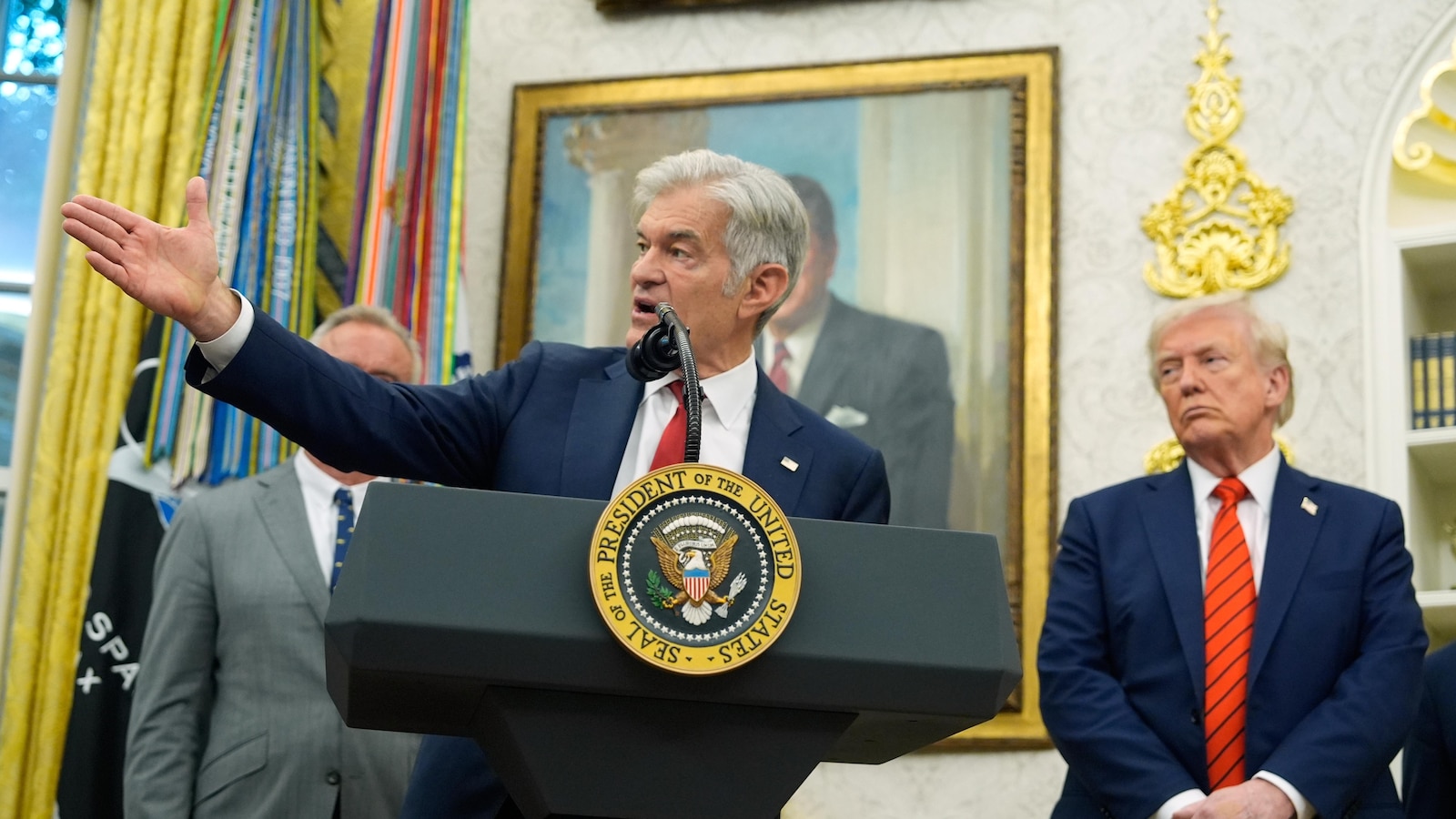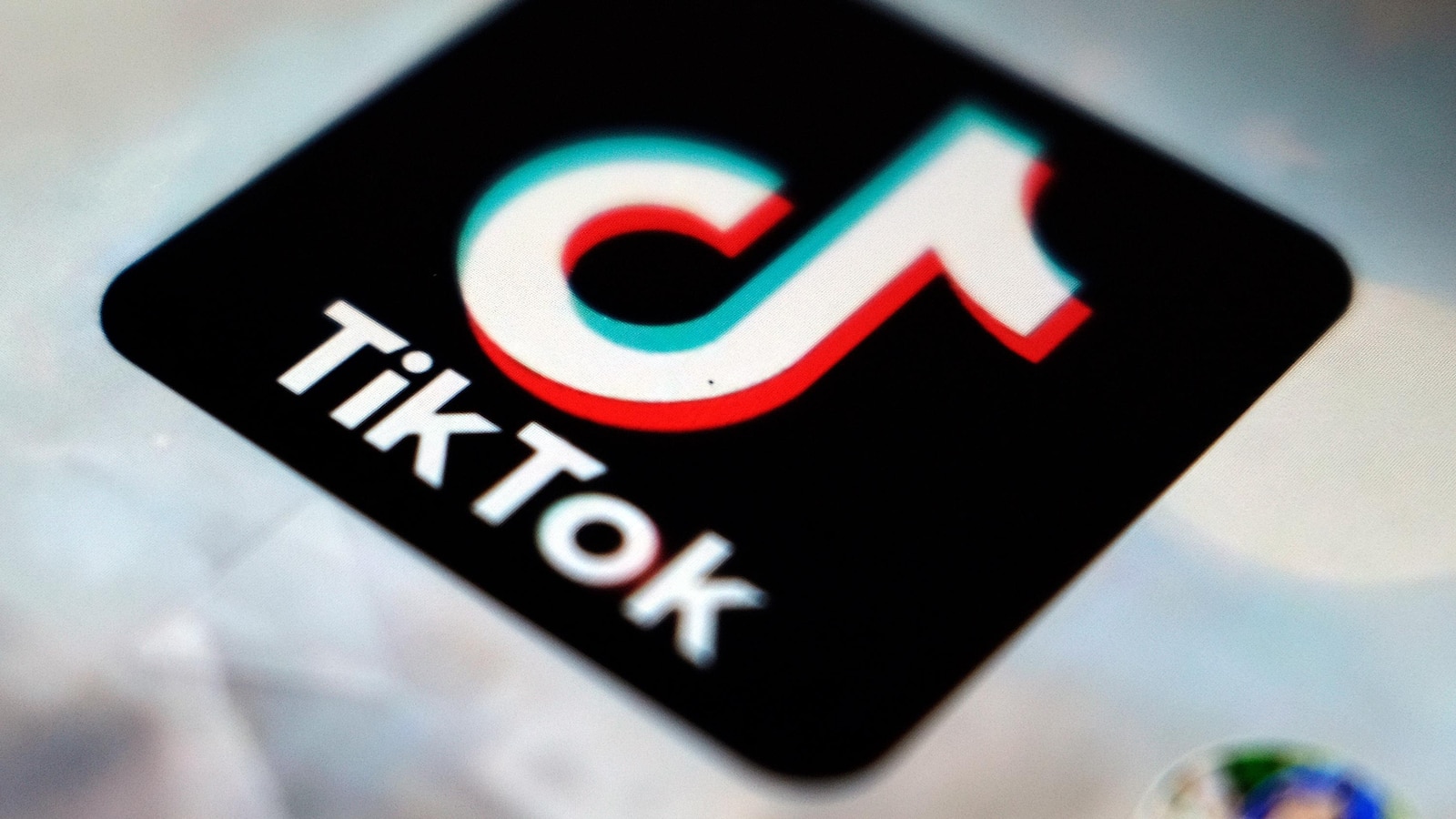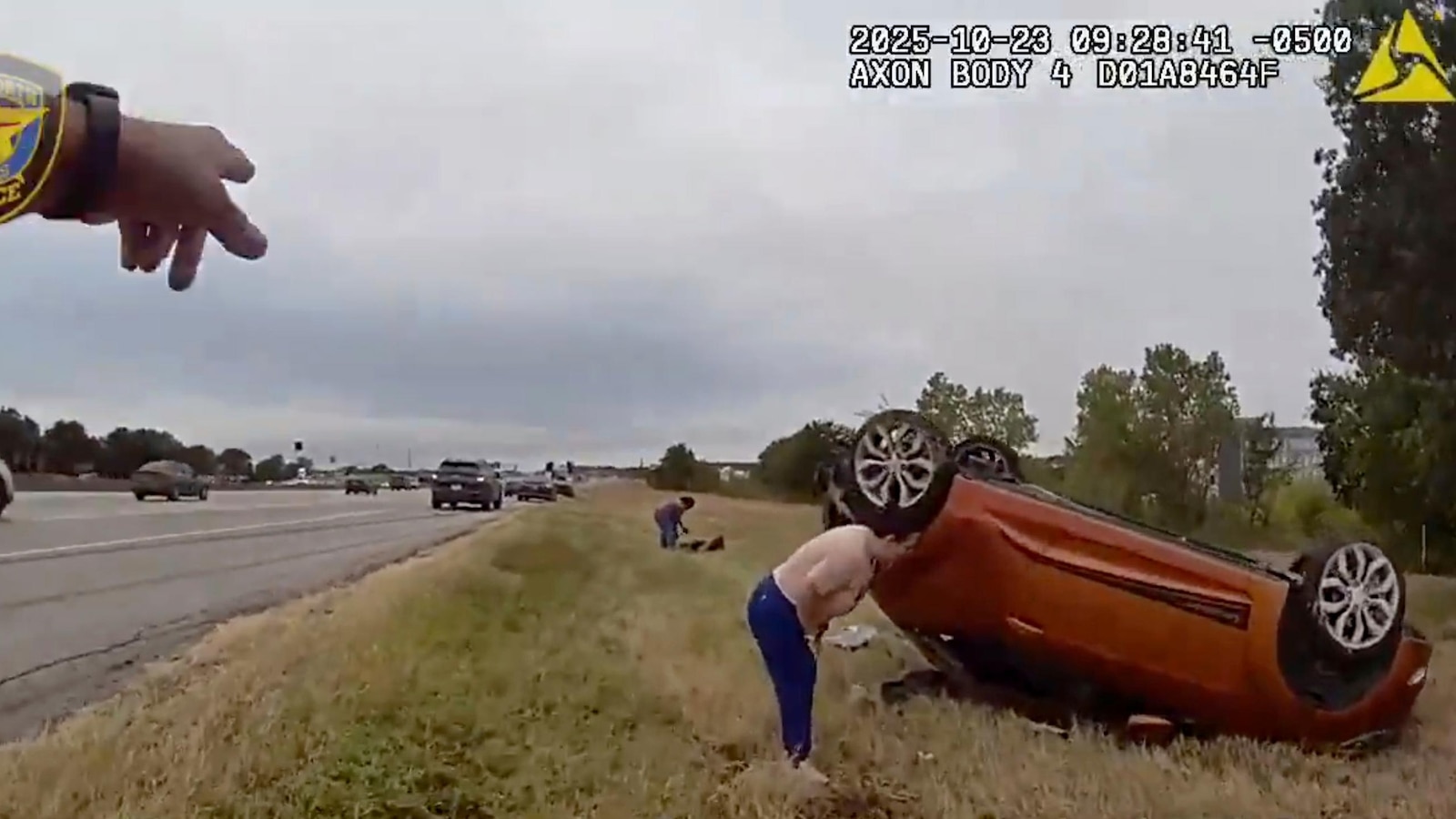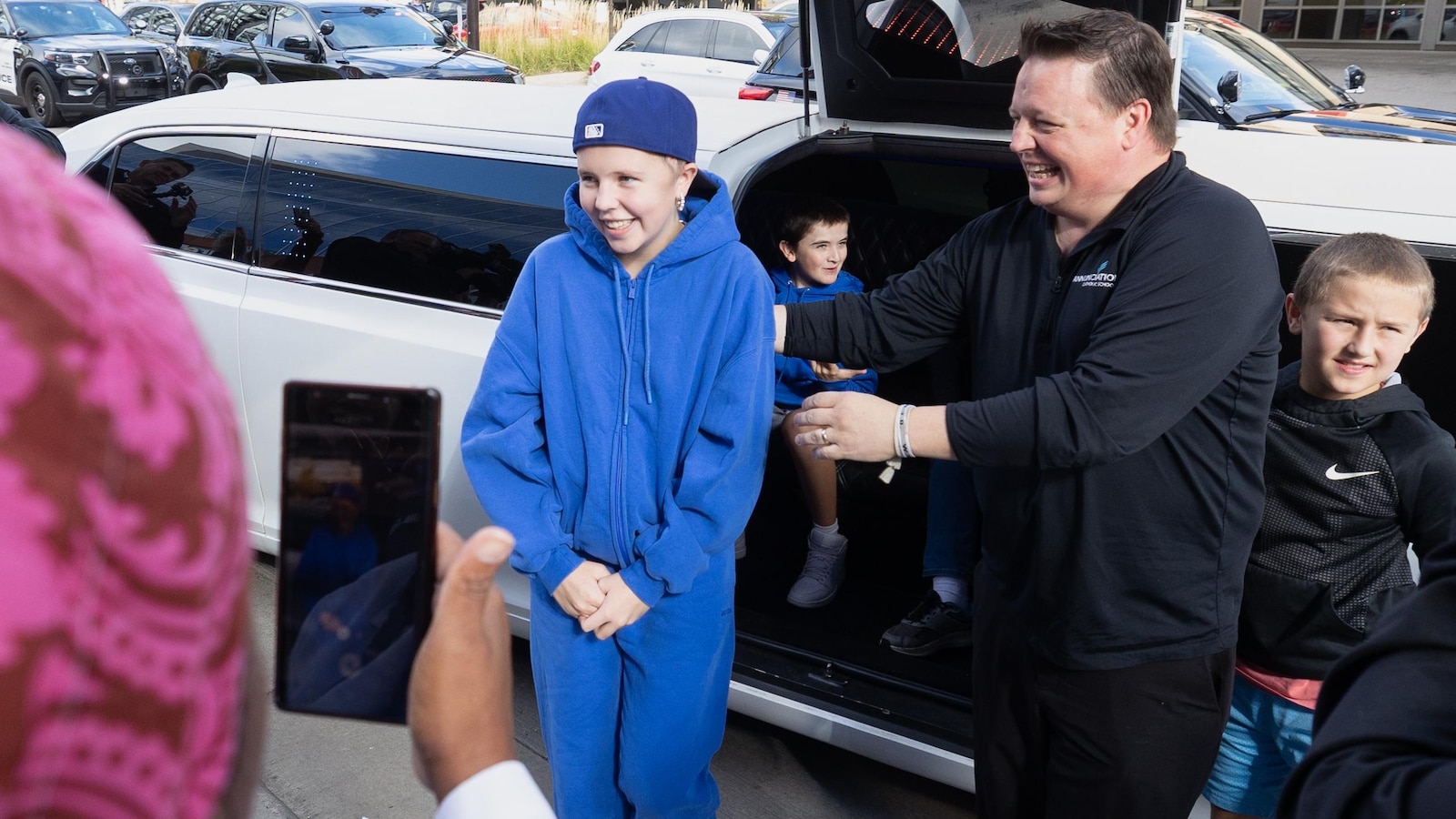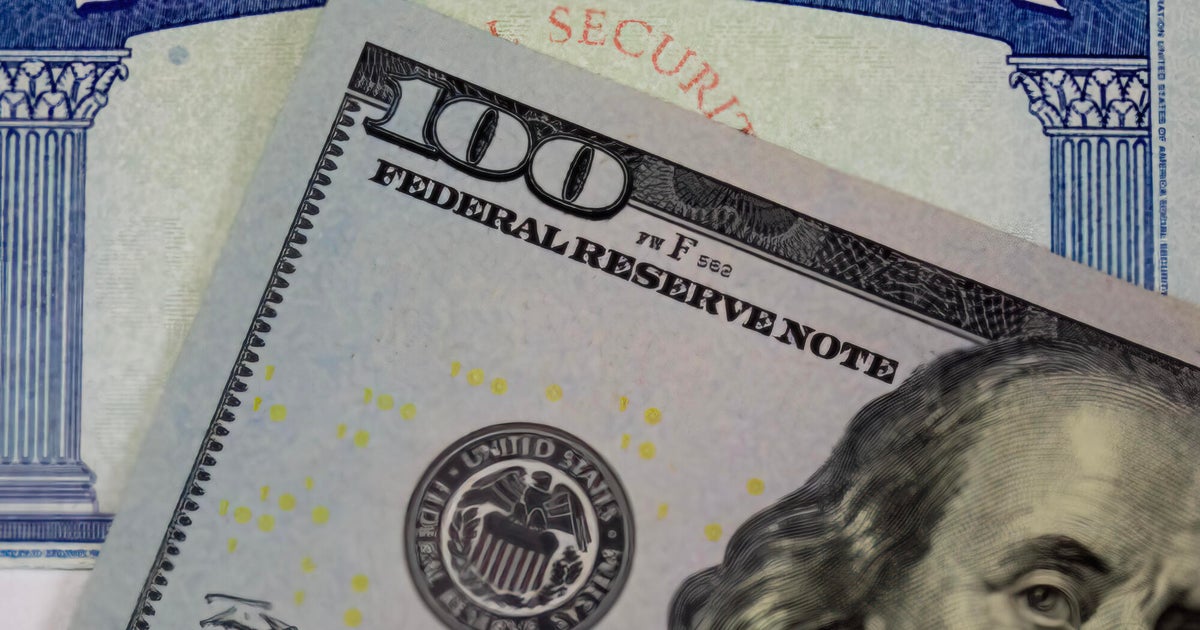Wind advisory issued for 5 Freeway corridor near Santa Clarita and Western Antelope Valley Foothills – Orange County Register
5 Freeway corridor near Santa Clarita and Western Antelope Valley Foothills were placed under an updated wind advisory by the National Weather Service on Sunday at 2:13 a.m. The advisory is valid from 5 p.m. until Monday Oct. 27, at 6 a.m.
According to the NWS Los Angeles/Oxnard CA, “Northwest to north winds 20 to 35 mph with gusts up to 55 mph expected.”
“Gusty winds will blow around unsecured objects. Tree limbs could be blown down and a few power outages may result,” according to the NWS. “Winds this strong can make driving difficult, especially for high profile vehicles. Use extra caution.”

Understanding high wind alerts
When it comes to high wind alerts, staying informed is essential. The NWS employs three alert levels to convey the severity of high winds:
High wind warning: Take action!
Sustained, strong winds with even stronger gusts are happening. Seek shelter. If you are driving, keep both hands on the wheel and slow down.
Wind advisory: Take action!
Strong winds are occurring but are not so strong as to warrant a High wind warning. Objects that are outdoors should be secured and caution should be taken if driving.
High wind watch: Be prepared!
Sustained, strong winds are possible. Secure loose outdoor items and adjust plans as necessary so you’re not caught outside.
How to prepare before strong winds approach
- Trim tree branches away from your house and power lines.
- Secure loose gutters and shutters.
- Identify an interior room of your house, such as a basement or interior bathroom, that you can take shelter in during high wind warnings.
- If you live in a mobile home, identify a sturdy building you can go to if the NWS issues a high wind or severe thunderstorm warning.
- Charge batteries of all essential items such as cell phones and booster packs, weather radios and power tools such as a reciprocating saw, which you might need to clear debris.
- Update your emergency kit and be sure to include enough food and water to last for 3 days for each person in your home.
- Make a list of items outside your home you will need to tie down or put away so that they don’t blow away or fly through a window. When the NWS issues a high wind watch, immediately secure these items to avoid damage or injury once the wind starts picking up.
How to act during strong winds
Take shelter:
- Immediately go inside a sturdy building during a high wind warning or severe thunderstorm warning and move to an interior room or basement.
- If you are in a mobile home, move to a sturdy building before the winds pick up or the storm system reaches your location.
If caught outside or driving:
- Take shelter in your car if you are not near a sturdy building. If possible, drive to a nearby sturdy building. Otherwise, move your car to a location where it is less likely to be hit by falling trees or power lines.
- If no shelter is available avoid trees, power lines, and the side of the road. Keep in mind that power lines that are laying on the ground may be live. Do not go near them! Try to find a place that will block blowing or falling debris.
- If you are driving and aren’t near a sturdy building, hold the steering wheel with both hands and slow down.
- Keep a distance from high profile vehicles such as trucks, buses and vehicles towing trailers. One strong gust of wind can be enough to flip one of these trailers onto its side.
What to do after strong winds subside
- Do not go near downed power lines. Report downed power lines to the police.
- Be careful when handling debris that may have blown into your yard.
Originally Published:
Source link
Wind advisory affecting 5 Freeway corridor near Santa Clarita and Western Antelope Valley Foothills – Press Enterprise
5 Freeway corridor near Santa Clarita and Western Antelope Valley Foothills are under a wind advisory which was released by the National Weather Service on Sunday at 12:52 a.m. The advisory is valid from 5 p.m. until Monday Oct. 27, at 6 a.m.
The NWS Los Angeles/Oxnard CA said, “Northwest to north winds 20 to 35 mph with gusts up to 55 mph expected.”
“Gusty winds will blow around unsecured objects. Tree limbs could be blown down and a few power outages may result,” according to the NWS. “Winds this strong can make driving difficult, especially for high profile vehicles. Use extra caution.”

High wind alerts: What each level signifies
When it comes to high wind alerts, staying informed is essential. The NWS categorizes high wind alerts into three levels, each signifying a different degree of risk:
High wind warning: Take action!
Sustained, strong winds with even stronger gusts are happening. Seek shelter. If you are driving, keep both hands on the wheel and slow down.
Wind advisory: Take action!
Strong winds are occurring but are not so strong as to warrant a High wind warning. Objects that are outdoors should be secured and caution should be taken if driving.
High wind watch: Be prepared!
Sustained, strong winds are possible. Secure loose outdoor items and adjust plans as necessary so you’re not caught outside.
How to prepare before strong winds approach
- Trim tree branches away from your house and power lines.
- Secure loose gutters and shutters.
- Identify an interior room of your house, such as a basement or interior bathroom, that you can take shelter in during high wind warnings.
- If you live in a mobile home, identify a sturdy building you can go to if the NWS issues a high wind or severe thunderstorm warning.
- Charge batteries of all essential items such as cell phones and booster packs, weather radios and power tools such as a reciprocating saw, which you might need to clear debris.
- Update your emergency kit and be sure to include enough food and water to last for 3 days for each person in your home.
- Make a list of items outside your home you will need to tie down or put away so that they don’t blow away or fly through a window. When the NWS issues a high wind watch, immediately secure these items to avoid damage or injury once the wind starts picking up.
How to act during strong winds
Take shelter:
- Immediately go inside a sturdy building during a high wind warning or severe thunderstorm warning and move to an interior room or basement.
- If you are in a mobile home, move to a sturdy building before the winds pick up or the storm system reaches your location.
If caught outside or driving:
- Take shelter in your car if you are not near a sturdy building. If possible, drive to a nearby sturdy building. Otherwise, move your car to a location where it is less likely to be hit by falling trees or power lines.
- If no shelter is available avoid trees, power lines, and the side of the road. Keep in mind that power lines that are laying on the ground may be live. Do not go near them! Try to find a place that will block blowing or falling debris.
- If you are driving and aren’t near a sturdy building, hold the steering wheel with both hands and slow down.
- Keep a distance from high profile vehicles such as trucks, buses and vehicles towing trailers. One strong gust of wind can be enough to flip one of these trailers onto its side.
What to do after strong winds subside
- Do not go near downed power lines. Report downed power lines to the police.
- Be careful when handling debris that may have blown into your yard.
Originally Published:
Source link
Rivian lays off hundreds amid a slowdown in EV demand
The electric truck and SUV company Rivian will lay off hundreds of employees in an attempt to save cash as federal support for electric vehicle adoption wanes under the Trump administration.
The layoffs come less than a month after the expiration of a federal tax credit that once saved many customers $7,500 on new electric vehicles and $4,000 on used ones. Experts said sales will falter without the credit, which ended Sept. 30.
Irvine-based Rivian plans to lay off more than 600 workers, a company spokesperson confirmed, or about 4.5% of its workforce. The company had just under 15,000 employees at the end of last year.
“We have made the very difficult decision to make a number of structural adjustments to our teams,” Chief Executive RJ Scaringe wrote in a note to employees Thursday. “With the changing operating backdrop, we had to rethink how we are scaling our go-to-market functions.”
Rivian wasn’t the only tech company to announce cuts this week, with Meta laying off 600 employees within its artificial intelligence department on Wednesday in an effort to streamline operations and decrease bloat. Meta has revamped its approach to AI in recent months as it competes with OpenAI and Google.
Last month, Rivian had a smaller round of layoffs that affected around 200 employees, or 1.5% of the workforce.
Demand for electric vehicles is stalling as the market becomes saturated and the vehicles get harder to afford, iSeeCars.com analyst Karl Brauer said.
President Trump’s reversal of Biden-era EV incentives, as well as recent auto tariffs that make cars and parts more expensive, are contributing to the slowdown.
Rivian reported a 32% increase in vehicle sales to 13,201 in the third quarter, but lowered its estimate of sales for the full year. The company now expects to deliver between 41,500 and 43,500 vehicles in 2025, down from 46,000.
Brauer said the layoffs are indicative of troubles in the industry, especially for companies such as Rivian and Tesla that produce only electric vehicles and no gas-powered alternatives.
“Electric vehicle production is going to be cut back by every company due to falling demand,” Brauer said. “For purely EV makers, they’re probably already feeling it.”
EV sales in California in 2024 were flat compared to previous years, The Times reported, raising questions on whether automobile manufacturers can meet ambitious state mandates for zero-emission vehicle sales.
To boost sales, Rivian is preparing to launch a new, more affordable model expected to start at $45,000. The company’s current least expensive model is the R1T pickup, priced around $71,000. That price point is inaccessible for many consumers, particularly with the loss of the federal tax credit.
Tesla, the electric vehicle giant run by Elon Musk, released lower-priced versions of its Model 3 and Model Y vehicles earlier this month. The launch did not impress investors, however, and analysts said the new prices are not low enough to trigger a buying surge.
The new Model 3 Standard starts at $36,990, $5,500 less expensive than the existing version of the car. The Model Y Standard starts at $39,990, $5,000 less than its pricier counterpart.
Tesla’s stock remained stable after the company reported its third-quarter earnings earlier this week. The company saw a 6% year-over-year increase in total automotive revenues.
Still, Tesla’s numbers missed analysts’ estimates, and Musk has yet to deliver on his long-promised robotaxi venture. Rivian reports its earnings on Nov. 4.
Following the news of the upcoming layoffs, Rivian’s stock was up more than 1% in trading on Thursday. Its shares have shown little change so far this year, while the tech-heavy Nasdaq Composite Index rose more than 15% over the same period.
Rivian and other EV makers benefited from a temporary surge in sales ahead of the tax credit’s expiration, as customers rushed to get the discount while it was still available.
National sales of new EVs jumped 19% in July from last year, Cox Automotive said, and sales in Orange County increased 7% in July from the month prior.
Now that the credit has been eliminated, the dropoff in sales could be harsh, Brauer warned. Rivian might get a boost when it releases its cheaper model, but the company needs to conserve funds in the meantime.
“Rivian is acknowledging that, and they’re reconfiguring their production plans and their cost structure as a result,” Brauer said. “That’s why they’re laying people off.”
Source link
Dodgers’ Yamamoto finishes the job with an old-school CG in World Series

TORONTO — Stand down, Dodger fans. No reason for fear. Yoshinobu Yamamoto is here.
Whatever pearl-clutching resulted from Friday night’s 11-4 pasting by the Toronto Blue Jays in Game 1 of the 2025 World Series was short-lived. Yamamoto was able to do in Saturday night’s series-evening 5-1 Dodgers victory what Blake Snell couldn’t the night before.
Did someone say complete games are passé? Not in this case. Dodgers manager Dave Roberts might be inclined to pull other starters at the 100-pitch mark, but for the second straight start he left Yamamoto alone, and the right-hander from Bizen, Okayama Prefecture, delivered again with a 105-pitch complete game in the Dodgers’ 5-1 victory that might have served as a response to the reputation of the Blue Jays as a team that gets the bat on the ball consistently.
Or it was a response to that Game 1 drubbing. Or maybe just a stubborn resolve that if something bad was to happen, it wouldn’t be on his watch.
“Needless to say, today’s game, we had to win,” Yamamoto said through his interpreter, Yoshihiro Sonoda. “So that’s just how I treated this game.”
That’s not as easy as he made it sound.
“Outstanding, uber competitive, special,” Roberts said. “Yeah, he was just locked in tonight. It was one of those things he said before the series, losing is not an option, and he had that look tonight.
“… You know, he’s pitched in huge ball games in Japan. He’s pitched in the WBC. Players that have the weight of a country on their shoulders, that’s pressure. So I just feel that part of his DNA is to just perform at a high level in big spots and control his heartbeat and just continue to make pitches.
“I mean, he could have went another 30, 40 pitches tonight.”
Wouldn’t that have been a shock to all of those critics who regularly accuse Roberts of being too quick with the hook.
Yamamoto fanned eight with a game-high 17 swings and misses, allowed four hits and retired the last 20 hitters he faced in becoming the first to pitch a complete game in the World Series in 10 years, or since the Kansas City Royals’ Johnny Cueto in 2015. And he’s the first pitcher with multiple complete games in a postseason since the San Francisco Giants’ Madison Bumgarner went the distance in a Wild Card game and Game 5 of the World Series in 2014.
Similar to Snell on Friday night, Yamamoto had a high pitch count at the start, 33 in the first two innings. Unlike Snell, who continued to struggle before coming out in the sixth, Yamamoto got better – much better – as the evening wore on.
The first inning should have been a tipoff. George Springer led off the game with a double and Nathan Lukes singled him to third, with Vladimir Guerrero Jr., the hottest hitter in the Toronto lineup, lurking.
Yamamoto struck him out on a curveball after four straight splitters, only Guerrero’s fourth strikeout of the postseason. Yamamoto then got Alejandro Kirk on a liner to first baseman Freddie Freeman and struck out Daulton Varsho.
“That was probably our best chance … after that, it was kind of few and far between,” Toronto manager John Schneider said. “… I think he made it hard for us to make him work. He was in the zone, (splitter) was in and out of the zone. It was a really good performance by him.”
This was similar to Yamamoto’s start in Game 2 of the National League Championship Series in Milwaukee. The previous night, Snell had pitched a gem but was removed after eight innings and 103 pitches, and it took two relievers to nail down the 2-1 victory that launched a four-game sweep. Yamamoto took the mound for Game 2 and polished off the Brewers in 111 pitches, striking out seven, not allowing a hit after the fourth and retiring the last 14 men he faced.
He almost makes it impossible to take him out. Roki Sasaki started throwing in the bullpen as the ninth inning began Saturday night, just in case, but there was no need. After having struck out the side in the eighth on 14 pitches, Yamamoto needed only 12“more to wrap it up in the ninth.
So can we argue that Yamamoto might be – no, is – this staff’s actual ace? Can we stipulate that the 12-year, $325 million contract with which the Dodgers landed him before last season is actually a bargain, regardless of the noise made by those who subscribe to the “buying championships” narrative?
In the regular season, Yamamoto was 12-8 with a 2.48 ERA, second to Pittsburgh Pirates ace Paul Skenes in the National League and fourth best in baseball behind Skenes, Detroit’s Tarik Skubal and Houston’s Hunter Brown. He did so while making a staff-high 30 starts, posting regularly and with consistency while Snell, Tyler Glasnow, Clayton Kershaw and Sasaki, all projected starters, missed time recovering from injuries.
In only four of his 30 starts did he allow more than three earned runs. He had 18 quality starts (six innings or more, three runs or less), and this should be a tipoff as to his postseason readiness: In his last seven regular-season starts he had a 1.53 ERA and completed less than six innings only once. (That stretch came after he gave up six runs in 4⅔ innings against the Angels on Aug. 11, so maybe he had something to prove.)
In this postseason, he is now 3-1 with a 1.56 ERA in four starts, with 26 strikeouts in 29⅔ innings. He was unintimidated by the loud and raucous crowd in Rogers Centre, a trait that will come in handy if he is needed to pitch a Game 6 back here next Friday.
And don’t look now, but in Saturday night’s interview session it was suggested to Roberts that, given the pitching legacy of this organization, maybe some comparisons would be in order. One questioner, name-dropping Orel Hershiser and Sandy Koufax, wondered if these two games were evidence that Yoshinobu is indeed a throwback to those years when men were men and only slackers didn’t finish what they started.
“You look at Yamamoto, it’s kind of the throwback in the sense of, when he starts a game, he expects to finish it,” Roberts said. “And he’ll go as long as I let him. But that’s his intent.”
The Hershiser reference is particularly relevant. He was the last Dodgers pitcher to complete a World Series start, doing so twice against the Oakland A’s – including the Game 5 clincher – in that magical October of 1988. That marked three complete game victories in a row, counting his Game 7 NLCS victory over the Mets.
Yamamoto might indeed get that shot to duplicate Hershiser in Game 6 – if the series goes that far.
jalexander@scng.com
Originally Published:
Source link
Why the time difference between the US and Europe will be one hour shorter this week
LONDON — For a week every October, people organizing international catch-ups and meetings on both sides of the Atlantic may be briefly confused: Did I just miss that conference call? Why is my grandmother calling me so early?
Most people quickly remember: It’s that strange time each fall when Europe and the United States are out of sync as they switch from daylight saving time to standard time.
Most countries do not observe daylight saving time. And for those that do — mostly in Europe and North America — the date of the clock change varies, partly because of how time-related laws were developed in difference places.
In countries that observe the practice, clocks are set forward one hour from standard time in March to make the most of increased summer daylight hours in the northern hemisphere.
Clocks “fall back” again in the autumn to standard time.
In the U.K. and Europe, this takes place at 2 a.m. on the last Sunday in October.
But in the U.S. and Canada, clocks go back one hour at 2 a.m on the first Sunday in November.
That in-between week means that the time difference between the two sides of the Atlantic — for example between London and New York — is one hour shorter than usual, potentially causing chaos for coordinating Zoom calls or other meetings.
The idea of daylight saving time had been floated for several hundred years, but didn’t become a standardized common practice written into law in many countries until the early 20th century.
Europe first adopted it during World War I as a wartime measure to conserve energy. Germany and Austria began moving their clocks by an hour in the summer of 1916. The U.K. and other countries involved in the war followed soon after, as did the United States and Canada.
Efforts were made over the years to coordinate time settings in Europe, and from 2002 all European Union member states adjusted their clocks twice yearly on the same days in March and October.
However, there has been no success in coordinating the time change more widely.
In the U.S., a 1966 law mandated a uniform daylight saving time nationwide, though the dates marking the twice yearly transitions have changed over the years. In 2022 the Senate unanimously approved a measure that would make daylight saving time permanent across the United States, but it did not advance.
The current dates were established by Congress in 2005.
Many do not agree on the benefits of the seasonal time changes, and lawmakers in the U.S. and Europe have previously proposed getting rid of the time change altogether. So far no changes have been finalized.
Source link
Video shows dramatic rescue of baby pinned under overturned car in Texas
FORT WORTH, Texas — A baby is expected to make a full recovery after being pulled from under a vehicle that had flipped during a crash, authorities said Friday after releasing dramatic video that showed the rescue effort along a busy highway.
Officers responded to the scene Thursday morning after getting reports that the child and mother had been ejected from the car.
Body camera footage shared Friday on social media by the Fort Worth Police Department shows an officer running toward the overturned car and beginning to search for the child as a distraught woman can be heard in the background yelling for her baby.
The officer rallied other motorists who had stopped at the scene to help him lift the car.
“Under here, we need to move the car,” the officer tells them, saying he thinks the child is pinned underneath.
“Keep moving, keep moving,” the officer urges them as the car is lifted just enough for him to grab the child’s leg and pull it to safety.
The child was unresponsive, but one officer said he felt a pulse. They attempted to get the baby to take a breath, with one officer using his fingers to push on the child’s chest. The baby eventually began to make noises and then started to cry.
Police said both the mother and child were expected to make a full recovery.
“Although this video may be extremely difficult to watch, it is an important example of the kinds of situations that our police officers may come across while performing their duties,” the department said in its post.
Police Chief Eddie Garcia in a social media post referred to the child as a “little angel” and praised the officers for their heroism. The department also thanked the citizens who stopped to help with the rescue.
Source link
Girl shot in Minneapolis church returns home from the hospital
MINNEAPOLIS — A 12-year-old girl who was shot in the head during a deadly attack at a Minneapolis Catholic church in August was released from the hospital Thursday and greeted with cheers as the police chief paraded her around town in a stretch limousine, according to the Minneapolis Star Tribune.
Sophia Forchas was the most seriously wounded child among those who survived the shooting at the Church of the Annunciation. A shooter opened fire with a rifle through the windows of the church on Aug. 27 and struck some of the nearly 200 children celebrating Mass during the first week of school, killing two and wounding 17 people. The children who died were 8 and 10 years old.
Forchas was rushed into surgery. Her neurosurgeon, Dr. Walt Galicich, said a bullet had lodged in her brain, causing severe damage, including to a major blood vessel. Surgeons had to remove the left half of her skull to relieve the pressure inside her head. At a Sept. 5 news conference, Galicich had described worrying that Forchas could become “the third fatality in this event.”
He gave her a hug as she left the Hennepin County Medical Center, the Star Tribune reported, as many others outside held banners and waved.
Minneapolis Police Chief Brian O’Hara, who escorted Forchas around the city, described her return home as “nothing short of a miracle.”
She was again greeted with roaring applause and plenty of hugs as they pulled into her school’s parking lot.
Her parents, Amy and Tom Forchas, said in a statement that they were overwhelmed with gratitude for the medical professionals who saved their daughter’s life. They described her return home Thursday as “one of the most extraordinary days of our lives.”
Her healing journey will continue with outpatient therapy, and she still has a long road to recovery ahead, her parents said, adding that they’ve been excited to witness daily improvements in her speech, her ability to walk and “her personality shining through once more.”
Another child who had a traumatic brain injury from the shooting, Lydia Kaiser, 12, was similarly celebrated as she returned to school last week, according to an online fundraising page started to support her family. Kaiser also underwent surgeries to remove a bullet fragment and alleviate pressure inside her head.
Source link
Trump ally says grand jury empaneled in Florida to investigate a sweeping conspiracy against Trump
A key Trump ally says a federal grand jury has been empaneled in Florida that will begin meeting in January to investigate what he calls a decade-long conspiracy against President Donald Trump.
In a series of interviews with conservative podcasters over the last week, conservative attorney Mike Davis — a close friend and informal adviser to Attorney General Pam Bondi and other top Trump administration officials — has claimed that the grand jury will consider whether to bring criminal charges against top Democratic figures that Davis claims have colluded over the last decade to impede Trump, beginning with the investigation of Russian interference in the 2016 election through the criminal cases against the president.

The Federalist Society’s Mike Davis speaks with Missouri Republican Sen. Eric Schmitt at the CPAC DC conference at the Gaylord National Resort in Oxon Hill, MD on Thursday, 20, 2025. (
Dominic Gwinn/Middle East Images/AFP via Getty
“I’ve been publicly calling for this for three years. I’m going to make damn sure that these lawfare Democrats go to prison during the four years of President Trump’s second term,” Davis told conservative commentator Benny Johnson on Friday.
While Davis does not hold a government position, court documents confirm that a federal judge last month ordered a grand jury to be empaneled in Fort Pierce, Florida, beginning in January at the request of the Trump administration.
A representative of the United States Attorney’s Office for the Southern District of Florida did not immediately respond to a request for comment about the purpose of the grand jury.
A conservative lawyer who helped shepherd Trump’s nominees through the Supreme Court confirmation process, Davis now runs the Article III Project, an organization that describes itself as devoted to helping “fight leftist lawfare to defend the rule of law.”
Trump has recently called for the prosecution of some of the same officials accused by Davis of using lawfare to target him.
“They cheated and rigged the 2020 Presidential Election,” Trump wrote on social media Saturday. “These Radical Left Lunatics should be prosecuted for their illegal and highly unethical behavior!”
Trump has not yet commented on Davis’ remarks on the conservative podcasts.
In an interview on “The Charlie Kirk Show,” Davis said his “buddy” Jason Quiñones — the United States Attorney for the Southern District of Florida — moved to empanel the grand jury after Davis “pushed very hard” to investigate what he says is a conspiracy against Trump.
Davis has suggested that top officials, including former Attorney General Merrick Garland, Deputy Attorney General Lisa Monaco, FBI Director Chris Wray and Special Counsel Jack Smith should be compelled to testify before the grand jury to answer questions about what Davis says is the politicized use of the legal system.
Quiñones and representatives from the Southern District of Florida did not immediately respond to ABC News’ requests for comment.
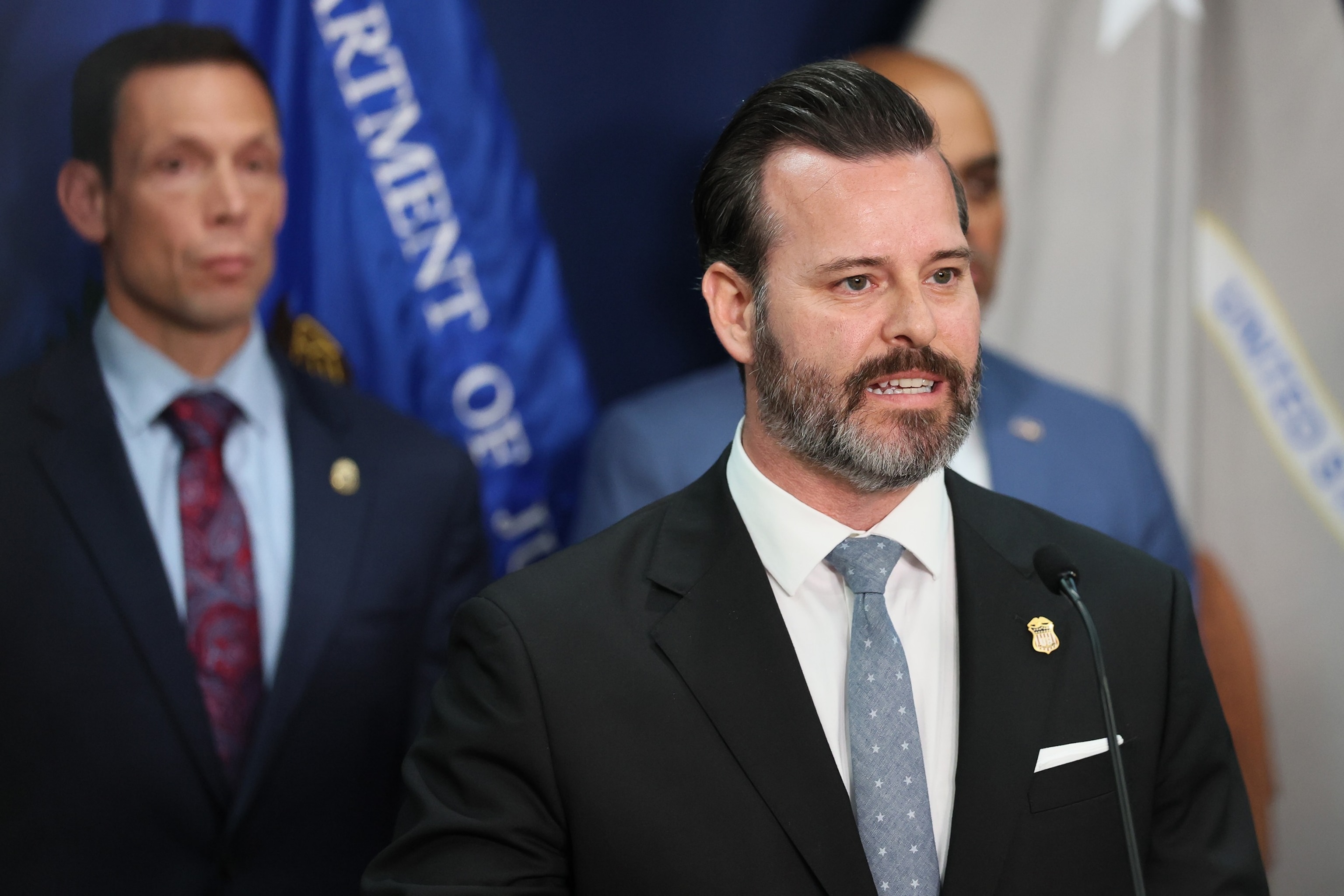
Attorney for the Southern District of Florida Jason A. Reding Quinones speaks during a press conference at the U.S. Attorney’s Office on August 25, 2025 in the Brooklyn Heights neighborhood of the Brooklyn borough in New York City.
Michael M. Santiago/Getty Images
Davis has argued that the former Biden administration officials and others violated a section of federal law, known as 18 U.S.C. § 24, by conspiring to interfere with federally protected rights.
Created in response to a surge in violence during the Reconstruction period after the Civil War, the law has historically been used to protect the civil rights of Black Americans, though prosecutors have expanded it to apply to broader election-related and police-misconduct offenses.
Notably, Trump was accused of violating the statute after he allegedly sought to overturn the results of the 2020 election, though the case was dismissed after he won the 2024 election.
Davis claims that a wide array of actions — including the FBI’s investigations of Russian interference in the 2016 election and the Jan. 6 insurrection — were coordinated efforts by Democrats to impede and ultimately imprison Trump.
Davis also argues the criminal and civil cases against Trump, purported issues with Trump’s Secret Service protection ahead of two assassination attempts last year and the efforts to remove Trump from the ballot in 2024 could also be violations of federal law.
“They took the country to the break. They tried to bankrupt Trump for non-fraud. They tried to throw him in prison four times for non-crimes. They tried to take him off the ballot in Colorado and made it elsewhere unconstitutionally. They tried to take off his head when Joe Biden underfunded Trump’s Secret Service protection, said he was the biggest threat to democracy and to put a bull’s eye on Trump,” Davis said on Friday on the Johnson podcast.
With some Republican senators now raising concerns over the scope of the federal investigation of the attempt to overturn the results of the 2020 election — including the subpoenaing of phone records of multiple senators — Davis has argued he has enough support to carry out a sweeping investigation.
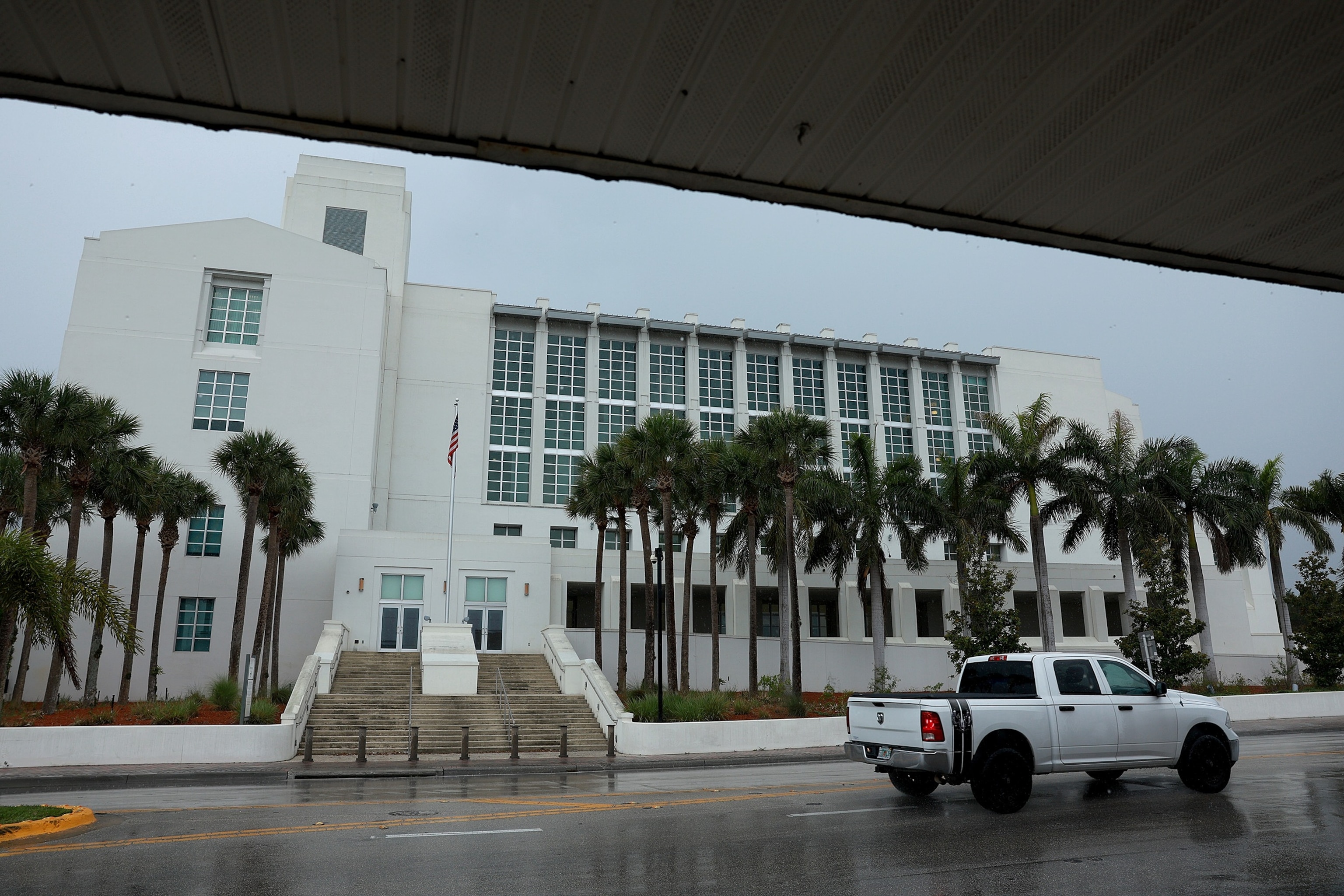
The Alto Lee Adams Sr. United States Courthouse where U.S. District Judge Aileen Cannon scheduled former President Donald Trump’s trial to begin Aug. 14 in her courtroom on June 20, 2023 in Fort Pierce, Florida. (Photo by Joe Raedle/Getty Images)
Joe Raedle/Getty Images
“There’s now a special grand jury that Jason [Quiñones] just motioned the court and the Southern District of Florida to open in Fort Pierce. That’s going to be empaneled in January. I think that sounds like a great place to open up this grand jury on Crossfire Hurricane and against these lawfare Democrats,” Davis said Friday.
The setting for the grand jury in Fort Pierce’s federal courthouse is a familiar one for Trump and his allies — it’s the same courthouse where he attended multiple hearings in his criminal case for allegedly retaining classified documents and obstructing justice. Davis claims the classified documents case, which was dismissed by a federal judge before the 2024 election, is part of the conspiracy against Trump as well.
“As I promised and as I will deliver, justice is definitely coming,” Davis said Friday on Johnson’s podcast.
Source link
Trump hikes tariffs on Canada by another 10% in response to Ontario’s anti-tariff ad
President Trump announced Saturday that he is raising U.S. tariffs on Canada by an additional 10% in response to the continued airing of an anti-tariff advertisement created by the local government of the Canadian province of Ontario.
In a post to Truth Social Saturday afternoon, Mr. Trump described the airing of the ad during Friday night’s Game 1 of the World Series as a “hostile act.”
“Because of their serious misrepresentation of the facts, and hostile act, I am increasing the Tariff on Canada by 10% over and above what they are paying now,” Mr. Trump wrote.
The move comes even though Ontario’s leader said the ad would be halted beginning Monday.
CBS News has reached out to the White House for comment on when such an increase would take effect and what imports it would apply to, and to Global Affairs Canada.
Earlier this month, Ontario officials began airing an ad featuring excerpts from a 1987 radio address by the late President Ronald Reagan in which he said tariffs work “only for a short time” and “hurt every American worker and consumer.”
The ad drew the ire of Mr. Trump Thursday, who reacted by terminating trade negotiations with Canada. The president also pointed to a statement from the Ronald Reagan Foundation alleging that the ad had misrepresented Reagan’s original radio address.
Following Mr. Trump’s comments, Ontario Premier Doug Ford said the ad campaign will be put on hold starting Monday “so that trade talks can resume.”
“Our intention was always to initiate a conversation about the kind of economy that Americans want to build and the impact of tariffs on workers and businesses,” Ford wrote on social media Friday. “We’ve achieved our goal, having reached U.S. audiences at the highest levels.”
In his post Saturday, however, Mr. Trump claimed that Ontario officials had indicated the ad “was to be taken down, IMMEDIATELY.”
The president claimed Ontario’s government allowed the ad to run Friday during the World Series between the Toronto Blue Jays and Los Angeles Dodgers “knowing that it was a FRAUD.”
Trade tensions between the U.S. and Canada have been ongoing for months amid the White House’s global trade war. Over the summer, Mr. Trump hiked tariffs on the country to 35%, though a large share of goods are exempt because they’re covered by the 2020 U.S.-Mexico-Canada Trade Agreement.
Back in March, Canada imposed 25% retaliatory tariffs on many U.S. products not covered by the USMCA. But in August, as part of efforts to reach a deal on tariffs, Canadian Prime Minister Mark Carney said those retaliatory tariffs were being lifted. The two nations have yet to reach such a deal.
Gambling makes it harder to believe in the NBA – Orange County Register

INGLEWOOD – We all have that friend who’s convinced that every airball, every blown call, every boneheaded turnover is evidence that the fix is in.
Maybe it’s you, maybe you’re that friend?
And I’m the one who’s been over here laughing at you, calling you a conspiracy nut. I’m the one rebutting, trying to tell you that mistakes happen by the hundreds in a human game like hoops – which will always be true, but also … I see now what you’ve been saying.
This week jogged my memory – oh yeah, NBC’s Bob Costas totally grilled late commissioner David Stern on air before the 1993 NBA Finals about the latest round of stories about Michael Jordan’s gambling – and so it’s suddenly hard not to unsee things that might or might not be there.
We all absorbed Thursday’s news that Portland Trail Blazers coach Chauncey Billups, current Miami Heat guard Terry Rozier and former NBA player Damon Jones were among the 34 defendants swept up in two separate federal investigations into illegal gambling charges. Six are accused of being involved in a sports betting case, and 31 for alleged involvement in rigged poker games.
We learned that Billups, a Basketball Hall of Famer who was previously an assistant coach on Tyronn Lue’s Clippers staff and, before that, a member of the team’s broadcast crew, was indicted for his alleged participation in a scheme to defraud card players in poker games that are said to have involved numerous members of New York crime families.
And, potentially more pertinent to the basketball-watchers who aren’t high-stakes poker players, we learned that Billups appears to be referenced – not by name, but by description – as a co-conspirator who allegedly told a bettor that some Trail Blazers players would miss a March 2023 game before that news was public.
His attorney, Chris Heywood, denied all the allegations, calling Billups “a man of integrity” and saying “men of integrity do not cheat and defraud others.”
Rozier is accused of sharing insider information, including going through with a plan to fake an injury early in a game. Jones is alleged to have passed along news of player availability the public was not privy to.
So, yes, to my long-suspicious sports-watchers: I get why phantom calls spook you. Why curious decisions seem suspicious.
Also, why load management and tanking and teams’ lack of transparency have all been even more damaging to the NBA than I initially considered; those practices make gaming this beautiful game too easy.
Even if the NBA wanted to unwind itself from gambling’s lucrative embrace, how could it possibly put a lid back on it now? The league asked for it, Commissioner Adam Silver writing a 2014 New York Times op-ed pointing out that nearly $400 billion was being illegally wagered on sports each year anyway, so, he asked, why not make it legal? Why not introduce oversight? (And, left unstated, a new revenue stream?)
On Friday’s episode of “The Herd with Colin Cowherd,” longtime NBA reporter Rachel Nichols said the NBA made $170 million directly from betting companies, and hundreds of millions of dollars more from gambling-driven fan engagement.
It seems that a league betting so big on betting, and that’s gotten so many people to play along, has in the process increased the number of bettors who might seek to fix a wager in their favor in what, yes, happens to be a human and corruptible game.
Sure, more legal betting means more regulation. And that should mean better odds of flagging fraud and punishing the bad actors, which theoretically should deter cheating – but at this point, that’s just trying to contain a problem that can’t be stopped.
What can be done? Should sportsbooks outlaw all unders, not just for two-way or 10-day players like Jontay Porter, the former Toronto Raptors’ two-way player who confessed to telling a bettor he was injured before removing himself from a game to control prop bets on his own play?
Should the NBA do more to discourage random days off? Tell teams their players can take a load off for a week and not just a night if they need rest or recovery that badly?
Or do we all just hold our noses and hope that ill-advised pass into traffic was just a brain fart and not something that really stinks?
Because at the moment, the stench is pervasive.
We had the “Inside the NBA” crew – now on ESPN, the network with its own official sportsbook – reaming the defendants in this newly announced federal case: “The notion that guys are making all this money and giving information, come on man, stop that,” Charles Barkley said. “Ain’t got nothing to do with [gambling] addiction, that’s just total stupidity.”
And we had Clippers coach Tyronn Lue expressing concern and support for Billups, his “best friend,” before the Clippers routed the Phoenix Suns, 129-102 – easily beating the 9.5-point spread – at this season’s Intuit Dome-opener Friday.
Lue reminded us that the charges against Billups are, in fact, allegations: “Just sad. Chauncey is my best friend, and having to go through something like this, the allegations. His family, my goddaughters. It was a tough day, seeing your friends go through anything like that.”
But Lue – who investigative podcaster Pablo Torre posted on social media Friday is said to have attended one of the allegedly rigged poker games in Las Vegas in 2019, but not to have sat at the same table as Billups – couldn’t say whether there should be a clear demarcation between the sports leagues and sports gambling.
“If the NBA partners with [betting companies], it must be good for the game or good for the NBA,” Lue said. “I can’t really comment on what’s good and what’s not good.”
Exactly. After this week, it’s harder to tell what’s good and what’s not good.
So maybe it’s me, maybe I’m that suspicious friend now?
Source link
Celebrate Dia de los Muertos on Olvera Street – Press Enterprise

Merchants on Olvera Street in downtown Los Angeles are celebrating Dia de los Muertos this week in a festival that continues through Sunday, Nov. 2.
The festival, which has taken place for nearly 40 years, celebrates the tradition of honoring departed loved ones.
Events are held every evening, with daytime entertainment on Saturdays and Sundays. Displays of “ofrendas” — altars made to honor loved ones who have departed — are exhibited 10 a.m. to 9 p.m. At 6 p.m. nightly, there’s a theatrical performance by Teatro del Barrio that tells the story behind the holiday.
The 7 p.m. nightly procession include a traditional Mayan blessing, an Aztec group with incense and ceremonial blessing, Aztec dancers and “living Muertos” (people dressed as skeletons). Free sweet bread and beverages will be available.
Location: El Pueblo de Los Angeles Historical Monument, 125 Paseo de la Plaza. Learn more: olveraevents.com/day-of-the-dead-olvera-street
Source link
Commentary: As Trump blows up supposed narco boats, he uses an old, corrupt playbook on Latin America
Consumer confidence is dropping. The national debt is $38 trillion and climbing like the yodeling mountain climber in that “The Price is Right” game. Donald Trump’s approval ratings are falling and the U.S. is getting more and more restless as 2025 comes to a close.
What’s a wannabe strongman to do to prop up his regime?
Attack Latin America, of course!
U.S. war planes have bombed small ships in international waters off the coast of Venezuela and Colombia since September with extrajudicial zeal. The Trump administration has claimed those vessels were packed with drugs manned by “narco-terrorists” and have released videos for each of the 10 boats-and-counting it has incinerated to make the actions seem as normal as a mission in “Call of Duty.”
“Narco-terrorists intending to bring poison to our shores, will find no safe harbor anywhere in our hemisphere,” Defense Secretary Pete Hegseth posted on social media and who just ordered an aircraft carrier currently stationed in the Mediterranean to set up shop in the Caribbean. It’ll meet up with 10,000 troops stationed there as part of one of the area’s biggest U.S. deployments in decades, all in the name of stopping a drug epidemic that has ravaged red America for the past quarter century.
This week, Trump authorized covert CIA actions in Venezuela and revealed he wants to launch strikes against land targets where his people say Latin American cartels operate. Who cares whether the host countries will give permission? Who cares about American laws that state only Congress — not the president — can declare war against our enemies?
It’s Latin America, after all.
The military buildup, bombing and threat of more in the name of liberty is one of the oldest moves in the American foreign policy playbook. For more than two centuries, the United States has treated Latin America as its personal piñata, bashing it silly for goods and not caring about the ugly aftermath.
“It is known to all that we derive [our blessings] from the excellence of our institutions,” James Monroe concluded in the 1823 speech that set forth what became known as the Monroe Doctrine, which essentially told the rest of the world to leave the Western Hemisphere to us. “Ought we not, then, to adopt every measure which may be necessary to perpetuate them?”
Our 19th century wars of expansion, official and not, won us territories where Latin Americans lived — Panamanians, Puerto Ricans, but especially Mexicans — that we ended up treating as little better than serfs. We have occupied nations for years and imposed sanctions on others. We have propped up puppets and despots and taken down democratically elected governments with the regularity of the seasons.
The culmination of all these actions were the mass migrations from Latin America that forever altered the demographics of the United States. And when those people — like my parents — came here, they were immediately subjected to a racism hard-wired into the American psyche, which then justified a Latin American foreign policy bent on domination, not friendship.
Nothing rallies this country historically like sticking it to Latinos, whether in their ancestral countries or here. We’re this country’s perpetual scapegoats and eternal invaders, with harming gringos — whether by stealing their jobs, moving into their neighborhoods, marrying their daughters or smuggling drugs — supposedly the only thing on our mind.
That’s why when Trump ran on an isolationist platform last year, he never meant the region — of course not. The border between the U.S. and Latin America has never been the fence that divides the U.S. from Mexico or our shores. It’s wherever the hell we say it is.

Colombian President Gustavo Petro Urrego addresses the 80th session of the United Nations General Assembly on Sept. 23 at U.N. headquarters.
(Pamela Smith / Associated Press)
That’s why the Trump administration is banking on the idea that it can get away with its boat bombings and is salivating to escalate. To them, the 43 people American missile strikes have slaughtered on the open sea so far aren’t humans — and anyone who might have an iota of sympathy or doubt deserves aggression as well.
That’s why when Colombian President Gustavo Petro accused the U.S. of murder because one of the strikes killed a Colombian fisherman with no ties to cartels, Trump went on social media to lambaste Petro’s “fresh mouth,” accuse him of being a “drug leader” and warn the head of a longtime American ally he “better close up these killing fields [cartel bases] immediately, or the United States will close them up for him, and it won’t be done nicely.”
The only person who can turn down the proverbial temperature on this issue is Secretary of State Marco Rubio, who should know all the bad that American imperialism has wrought on Latin America. The U.S. treated his parents’ homeland of Cuba like a playground for decades, propping up one dictator after another until Cubans revolted and Fidel Castro took power. A decades-long embargo that Trump tightened upon assuming office the second time has done nothing to free the Cuban people and instead made things worse.
Instead, Rubio is the instigator. He’s pushing for regime change in Venezuela, chumming it up with self-proclaimed “world’s coolest dictator” Nayib Bukele of El Salvador and cheering on Trump’s missile attacks.
“Bottom line, these are drug boats,” Rubio told reporters recently with Trump by his side. “If people want to stop seeing drug boats blow up, stop sending drugs to the United States.”
You might ask: Who cares? Cartels are bad, drugs are bad, aren’t they? Of course. But every American should oppose every time a suspected drug boat launching from Latin America is destroyed with no questions asked and no proof offered. Because every time Trump violates yet another law or norm in the name of defending the U.S. and no one stops him, democracy erodes just a little bit more.
This is a president, after all, who seems to dream of treating his enemies, including American cities, like drug boats.
Few will care, alas. It’s Latin America, after all.
Source link
SoCal pastor molested girls in church basement for years
A former Orange County pastor will spend decades behind bars after he used his trusted position as a spiritual leader to molest girls as young as 4 over the course of eight years, according to authorities.
Carlos Ramirez Valdez, 61, assaulted three children in places such as a church basement, his van and a backyard shed, according to the Orange County district attorney’s office.
Prosecutors say he met the victims while he was church leader at Iglesia De Dios Ebenezer in Santa Ana and was hired as a pastor at another Santa Ana church, International Mission Church USA, before he was arrested in 2021.
His abuses took place from 2012 to 2019, prosecutors said.
One girl was molested by Valdez for seven years, starting when she was just 4 years old, prosecutors said. Valdez was accused of repeatedly assaulting the girl in a church basement and in his van.
She ultimately reported the abuse to a school counselor.
In 2020, another girl came forward to police in Garden Grove and reported that Valdez had sexually abused her in 2014 and 2015 when he offered to give her a ride home from church, prosecutors said. She was 9 years old at the time of the abuse.
A third victim reportedly told Riverside police in 2020 that Valdez had repeatedly sexually assaulted her in a backyard shed for eight months when she was 7 and 8 years old, prosecutors said.
Valdez was convicted this summer of 11 felony counts of lewd acts with a minor under 14 and three felony counts of oral copulation or sexual penetration of a child 10 or younger, prosecutors said. He was sentenced Friday to 45 years to life in prison.
Investigators shared some of the tactics they say Valdez used to lure his victims into vulnerable places during testimony at his preliminary hearing, according to City News Service. He told one victim to come into his van because he needed to comb her hair or required help with something, authorities said, and then would proceed to molest her.
He was also accused of showing one of the victims an adult film while he assaulted her at his Riverside home, according to City News Service.
“Churches should be safe sanctuaries not hunting grounds for child molesters,” Orange County Dist. Atty. Todd Spitzer said in a statement. “These young girls were subjected to unimaginable abuse by someone in a position of trust. The sexual exploitation of children will never be acceptable, and predators will be prosecuted to the fullest extent of the law.”
Source link
Big wave machine — by the sea — rolling into El Segundo
The coastal city of El Segundo is an unlikely location for a massive, new artificial surf park.
Other California surf parks with machine-powered wave pools are inland, far from natural waves in places like Palm Springs and Lemoore in the San Joaquin Valley.
This summer, an owner of one of those parks, Palm Springs Surf Club, bought 10 acres of land on a former aerospace campus in El Segundo. The location is near a bonanza of sports enterprises that have sprung up in recent years, including a Topgolf entertainment complex and the training facility and headquarters of the Los Angeles Chargers football team.
A company tied to billionaire Vinny Smith’s Toba Capital paid $54 million for the site, said Colin O’Byrne, president of Inland Pacific Cos., the development partner of Toba Capital.
Smith, a tech mogul and surfer, and a major investor in the Palm Springs Surf Club, reportedly got involved after testing a wave prototype.

Surfers wait their turn at The Palm Springs Surf Club.
(David Fouts/For The Times)
The El Segundo surf park, which has yet to be named, will hold about 5 million gallons of water in a 2.2-acre lagoon, O’Byrne said. He hopes to secure city approval to start work on the project, valued at $175 million, in about six months.
El Segundo is already a legit surfing town, known for its custom surfboard shapers and waves at El Segundo Beach Jetty.
“El Segundo has been a mecca for surf culture since the 1950s,” City Councilman and surfer Drew Boyles said. “But frankly, the surf out front is consistently poor-to-fair and it’s, like, absolutely crowded. So, this wave pool is going to be incredible.”
Boyles likened the potential appeal of the surf park to Topgolf, which makes a point in its advertising of putting beginners at ease with swinging a club for fun while also appealing to experienced golfers.
“Topgolf basically lowered the barriers to entry for people to get into the game of golf,” Boyles said. “Wave pools are doing the same thing, lowering the barrier to entry for people to get into surfing in a controlled, safe environment that’s not as intimidating as the ocean, that’s predictable and consistent.”
Boyles, a real estate developer, is working on developing a surf park of his own in Phoenix.
O’Byrne, who has been learning to surf in Palm Springs, said the vibe in a man-made lagoon can be more pleasant than competing with other surfers at sea.
“You have the ability to have your own wave, and everybody’s rooting for you to make your wave as opposed to getting yelled at in the lineup as a beginner or intermediate level surfer.”

The wave pool at The Palm Springs Surf Club.
(David Fouts/For The Times)
In Newport Beach, the city is considering approval of the Snug Harbor Surf Park Project, which would redevelop the center portion of the Newport Beach Golf Course with approximately five acres of surf lagoons. It would replace the driving range and downsize the course to 15 holes.
The centerpiece of a typical surf park is a large pool holding millions of gallons of water and a machine that can generate as many as 1,000 waves per hour. Developers also typically add restaurants, shops and other attractions to broaden the park’s appeal.
DSRT Surf, expected to open in summer 2026 at the Desert Willow Golf Resort in the Coachella Valley, is set to offer pickleball courts, a swimming pool, yoga classes, a restaurant and a skate bowl. Future plans call for a 139-room hotel and 57 luxury villas.
Inland Pacific and Smith are also working on a 45-acre mixed-use development around a surf park in Oceanside valued at $275 million, O’Byrne said. It is to include shops and restaurants along with a hotel adjacent to a 2.5-acre lagoon.
In Las Vegas, the company acquired 66 acres of land on Las Vegas Boulevard just south of the airport for a surf-centric development.
Now that engineers have figured out how to create consistent waves in a controlled environment, there is potential demand for many more surf parks in the world, O’Byrne said.
“This has been attempted since the 1980s,” OByrne said. “We’re really at a point where the technology has advanced to be able to do these more economically and allow for more consistency and longer waves.”

Vistors watch surfers from dry land at The Palm Springs Surf Club.
(David Fouts/For The Times)
Inland Pacific acquired the El Segundo site from Continental Corp., a California landlord with millions of square feet of commercial properties along the South Bay coast, real estate data provider CoStar said.
Continental bought the 30-acre corporate campus from Raytheon in 2021 and launched plans to redevelop it into a 600,000-square-foot mixed-use complex with office, retail and media production space.
Los Angeles and Orange counties have the largest concentration of surfers in the world at more than 2 million, according to an estimate by Surf Lakes Socal, which is looking for investors to fund the development of more wave pools.
Source link
Teen, with her mother, dares to get out and enjoy the world – Press Enterprise
A recent TEDx Talks series at Old Town Temecula Community Theater was themed “Disrupt,” described as offering “bold perspectives,” designed to “disrupt the way we think.”
One of the presenters was a mother-daughter duo, Kennedy and Jennifer Swann, and they were disrupting any misconceptions about the quality of life people with disabilities might be limited to.
Jennifer Swann spent a few minutes laying the groundwork for a life story that challenges any idea that people with severe disabilities can’t enjoy active, fruitful lives. Then, a bright spotlight illuminated the stage as Kennedy Swann was rolled forward in her wheelchair and positioned next to her mother.
“My name is Kennedy. I am 15 years old. I am a singer, a dancer, an actress, and a social butterfly,” the Brea Olinda High sophomore told the audience. “In case you haven’t noticed, I look a little different than you. I have SMA, which makes my muscles weak. But that doesn’t really matter to me because I still do what I love.”
Incidentally, she is believed to be the first person ever to deliver a TED Talk using Eyegaze, a speech-generating device operated by her eyes.
At 9 months old, Swann was diagnosed with spinal muscular atrophy, a progressive, terminal neuromuscular condition, often described as the childhood version of ALS, commonly known as Lou Gehrig’s Disease.
She was unable to speak, needed a machine to help her breathe and a feeding tube. She would require 24-hour care, her parents learned, including respiratory treatments multiple times a day.
Even a common cold could be deadly.
“We didn’t leave the house a lot unless it was outdoors in well-ventilated areas, and we were very selective about who we let in our house,” Jennifer Swann told the audience. “We missed a lot of family gatherings. We didn’t know if she would see her second birthday.”
Jennifer Swann said she experienced firsthand what medical experts have pointed out for years: Caregivers are often anguished by feelings of hopelessness and devolve into emotional exhaustion.
Then, 12 years ago, she was sitting in a pediatric ICU room with her daughter when Jennifer Swann said she had a lightbulb moment.
“I got a crazy idea,” she said. “What would it be like for my family to go on a Disney Cruise?”
Doctors cautioned her that taking a child who didn’t have a stable airway on a cruise ship was a bad idea.
“I understood,” she said, “But the risk of continuing to do what we had been doing felt more dangerous.”
On the cruise with her parents and big brother, Swann was meeting Disney princesses and taking in the experience when her mother said she saw a version of her daughter she had not seen before.
Her daughter was “alive with joy, wide-eyed with wonder and loving every minute of it,” Jennifer Swann said.
“And suddenly, every decision I had ever made to contain her life in the name of safety felt completely backward,” Jennifer Swann said. “And I asked myself, why am I working this hard to keep her alive if I am not going to let her actually live?”
With proper planning and precautions, more Disney cruises and other trips followed, so did visits to Disneyland, playdates, dances, beach days and sleepovers, Jennifer Swann said.
Swann participates in the choir, musical theater and color guard at school.
Delivering the TEDx Talk, Swann told the audience how she loved meeting kids her own age.
“I make friends everywhere I go,” she said. “I once made a friend in the restroom at Disneyland. I love hanging out with friends and going to the mall, and I have a calendar of FaceTimes scheduled every month with people I know all over the country.”
The teen recalled the time when a respiratory virus was going around and she was told by her doctor that going to school would be too risky.
“I told him no,” she said. “I said there was a cute boy in my sixth period of class and I needed to see him every day. The doctor thought I was joking. I was not joking. So, we came to an agreement he could live with, and I stayed in school, and I did not get sick.”
Drawing on her experiences serving as the primary caregiver to a child with disabilities, and citing her daughter as her teacher, Jennifer Swann took a risk of her own.
She decided to leave her career as a constitutional law attorney, working for a federal judge, and design a curriculum for helping other parents of children with special needs.
Jennifer Swann went on to design the Flourish Method – a proprietary eight-step process to help guide parents from the point of overwhelming exhaustion to “peace, power, and possibility,” she said.
“The goal is to build a life they love right where they are,” Jennifer Swann said. “To empower parents to move beyond survival mode and embrace a life of possibility.”
Kennedy Swann’s bucket list remains full: Visit Paris, ride a roller coaster, FaceTime with Olivia Rodrigo and see Shawn Mendes in concert, just to name a few items.
“She is going to demand to do all the things that she wants to do,” Jennifer Swann said. “And, you know, if there are things that are a little outside the box, then she’s like, ‘Figure it out, mom.’”
Or as Kennedy Swann said: “Dare … sometimes you have to take a risk for what you want.”
Originally Published:
Source link
Gustafson puts Riverside Poly on his shoulders in win over Valley View – Press Enterprise

RIVERSIDE — Marjok Gustafson is not trying to shoulder the whole load for Riverside Poly’s football team.
Gustafson completed 20 of 28 pass attempts for three touchdowns as Riverside Poly beat Valley View 28-10 Friday night in a pivotal Sunbelt League matchup at Wheelock Stadium on the campus of Riverside City College.
“He’s getting better each week at execution,” Poly coach Jaron Gilbert said. “He’s keeping drives going and playing mistake-free football.”
Since returning from a shoulder injury that sidelined him for the game against Ramona, Gustafson has completed 73.8 percent of his pass attempts (62 of 84) and led Poly to four consecutive wins.
“Coming back from my injury, I’m taking my time, letting the offense develop and trusting my guys to do their jobs,” Gustafson said.
It’s the second straight week that the 6-foot-2 junior quarterback has completed 20 or more passes and tossed for three touchdowns.
“He’s been moving the ball around well and making great decisions,” Gilbet said. “If he can keep doing that, we’ll be in good spots.”
With the win, the Bears (6-3 overall, 4-0 Sunbelt) snapped a three-year losing streak to Valley View and secured at least a share of the league title going into their Week 10 matchup against Arlington.
“Last year we lost to Valley View, so it means a lot to bounce back and win this one,” Gustafson said.
After Valley View went three-and-out to start the game, Gustafson was 7 of 10 and connected with four different receivers on Poly’s 12-play, 9-plus-minute opening possession.
“I’m able to trust different guys every game and it’s been great,” said Gustafson, who hit Henry for a 19-yard touchdown to finish the drive.
Valley View began the second quarter with a 30-yard field goal from Efrain Dominguez, and held a 10-7 lead after a 17-yard pass from Jesse Vega fell into Alex Ramirez’s lap in the end zone.
Gustafson and Henry linked three more times on Poly’s next possession, including a second 19-yard touchdown to retake the lead.
Henry capped Poly’s nine-play drive to start the third quarter with a 12-yard option pass to Owen Kurkoske for a 21-10 lead.
Valley View, limited to just 34 rushing yards in the first half, produced only two first downs and was shut out in the second half.
The Eagles (5-4, 3-1) went three-and-out on their only two possessions of the third quarter and could not get past midfield in the fourth.
Vega finished 12 of 22 for 148 passing yards for Valley View. He was the game’s leading rusher with 13 carries for 43 yards.
Source link
China’s rare golden monkeys debut at European zoos, a possible successor to ‘panda diplomacy’
With their distinctive shaggy orange manes, pale blue faces and dense fur covering their hands and feet, it’s hard to mistake China’s endangered golden snub-nosed monkeys for any other animal.
These rare and charismatic monkeys, unique to the frigid mountains of central China, have recently joined the country’s famous pandas as furry envoys to zoos in Europe for the first time — on loan for 10 years from the same government-overseen group that coordinates official panda exchanges.
As with “ panda diplomacy,” some observers cheer new opportunities for scientific and conservation collaboration, while others raise concerns about the welfare of individual animal ambassadors transported around the world.
Three golden monkeys arrived at France’s Beauval Zoo in the city of Saint-Aignan this April, following an agreement to mark the 60th anniversary of the establishment of diplomatic relations between the People’s Republic of China and France.
Another trio of golden monkeys arrived at the Pairi Daiza zoo in Hainaut, Belgium, in May. The zoo distributed Belgian and Chinese hand flags to visitors on the day the monkeys arrived.
After a monthlong quarantine, the two sets of monkeys made their public debuts. So far, they appear to be in good health, according to the two zoos, adapting to new climates outside Asia for the first time.
At Pairi Daiza, the habitat enclosure for Liu Yun, Lu Lu and Juan Juan includes traditional Chinese gazebos with red columns and gray-tiled roofs, where the monkeys spend much of their time jumping between logs and rope ladders and scrambling over roofs.
“The diplomatic aspect comes from this cultural awareness,” said Pairi Daiza spokesperson Johan Vreys.
The hope is to build longstanding scientific exchanges between the zoos and Chinese authorities, said Anaïs Maury, the communications director for the Beauval Zoo.
The zoo is in discussions with China to launch joint research and conservation programs “similar to those already in place for other emblematic species like pandas,” Maury said.
Both giant pandas and golden snub-nosed monkeys are endangered animals that are unique to China and they can only be moved outside the country with approval from the central government, said Elena Songster, an environmental historian at St. Mary’s College of California.
While both species are considered national treasures, only monkeys have deep roots in Chinese art and culture, appearing in countless paintings and as characters in classic literature, including the wily Monkey King in the 16th century novel “Journey to the West.”
When pandas stepped, rolled, scratched and stumbled onto the world stage in recent decades, they quickly became symbols of modern China — in part to due to their own “cuddly cuteness” and deft diplomatic presentation, said Susan Brownell, a China historian at the University of Missouri, St. Louis.
The original soft power couple from post-war China was a pair of giant pandas, Ping Ping and Qi Qi, sent to the Soviet Union in 1957 to celebrate the 40th anniversary of the October Revolution, which led to the establishment of the world’s first Communist state.
In 1972, a pair of pandas was sent to the U.S. for the first time, following President Richard Nixon’s historic visit to Beijing. In 1984, China switched from gifting pandas to loaning them.
Following outcry from animal-rights activists, China ended the practice of short-term loans and began longer leases, usually around a decade. In this arrangement through the China Wildlife Conservation Association, part of the money that an overseas zoo pays annually to China must be earmarked for habitat conservation or scientific research to benefit the species.
Still, what benefits a species may not be beneficial to an individual animal. Transporting animals over long distances and sending their offspring back to China, as the agreements require, may highly stress animals, said Jeff Sebo, an environmental and bioethics researcher at New York University.
“Animal health and welfare matters,” he said, “not just for geopolitical or strategic aims.”
Within China, the golden snub-nosed monkeys today live across a swath of central and southwestern China that includes parts of Sichuan, Shaanxi, Gansu and Hubei provinces.
At the Shennongjia National Park in Hubei, conservation efforts since the 1980s have helped increase the region’s population threefold to around 1,600 monkeys today, said Yang Jingyuan, president of the Academy of Sciences at the park.
It’s unclear exactly how to evaluate the diplomatic track record of furry ambassadors.
Still, in an era of rising global tensions, “I think pandas are a really useful entryway,” said James Carter, a China historian at Saint Joseph’s University in Philadelphia. “Pandas open up an opportunity for people to think something positive about China — they’re cute, they don’t do anything bad.”
The golden snub-nosed monkeys now at zoos in France and Belgium are so far the only ones outside of Asia.
“China’s golden snub-nosed monkeys aren’t globally iconic yet,” said Brownell, “but there may be potential for them to be in the future.”
___
Associated Press video producer Wayne Zhang, in Shennongjia National Park, contributed to this report.
___
The Associated Press Health and Science Department receives support from the Howard Hughes Medical Institute’s Department of Science Education and the Robert Wood Johnson Foundation. The AP is solely responsible for all content.
Source link
How major US stock indexes fared Friday, 10/24/2025
Wall Street rose to records after an update said U.S. households are feeling a bit less pain from inflation than feared
Source link


